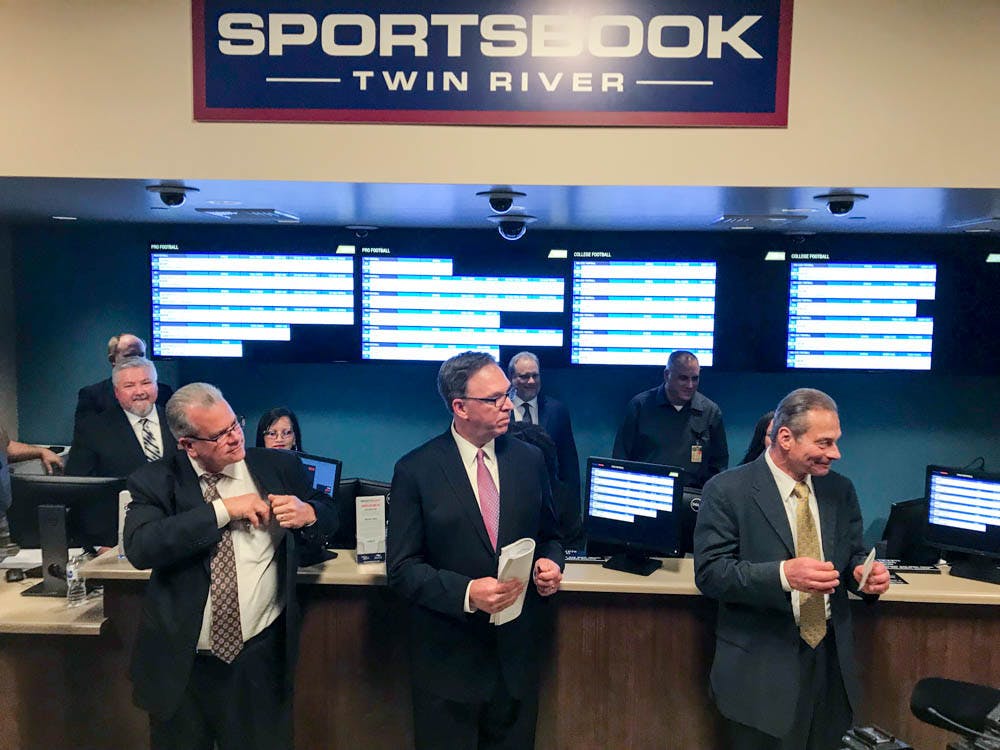Just outside Lincoln, slot machines glittered and chirped as gamers clutched Cash Out Vouchers and roamed around the halls. The new flat screen TVs flashed sports statistics and spreads as bookies prepared to accept the first ceremonial wagers. This was the scene at the Twin River Casino Monday as legal sports betting kicked off in Rhode Island.
Rhode Island legalized sports betting in June 2018, one month after the U.S. Supreme Court ruled to let state governments decide the legality of the industry. As of Nov. 26, the Twin River Casino in Lincoln is the only location open for gamers to legally place sports bets in New England. The casino plans to introduce sports betting in two phases. Phase One, rolled out Monday, consists of a more “traditional, Vegas-style sportsbook,” said Patti Doyle, spokeswoman for the casino. Bets can be placed on the NBA, NFL, MLB, NHL and NCAA teams at the book or nearby terminals. Doyle added that gamers are not permitted to place bets on Rhode Island sports teams, which includes those at the University.
Phase Two is set to launch in mid-December and consists of a new 3,600-square-foot sports lounge: “A tailgate party without having to go outside,” said Craig Sculos, vice president and general manager of property management at Twin Rivers Casino. He added that the lounge will be covered with approximately 100 TVs and have a dedicated dining service and bar. The renovation bill totaled near $1.5 million, according to John Taylor, chairman of the Board of Directors for Twin River Worldwide Holdings Inc.
In two to three months, sports betting will be expanded to the Twin Rivers Casino in Tiverton, Sculos said.
Rhode Island’s development of sports betting infrastructure taps into an industry that, while illegal, was estimated to generate $150 billion nationwide each year, according to The New York Times.
“It’s just an illicit industry, an untapped source of revenue,” said Ryan Burke ’19, who worked as a quantitative trading intern for a sports analytics group this summer, coding win probability models for in-game betting. He compared the potential markets in the United States to preexisting legal ones in Europe. “It’s already a big industry in Europe,” he said. “There’s a lot of industry that’s being generated over there. I think that by legalizing it you create a lot of tax revenue for the states.”
“In Rhode Island, it’s a new revenue stream, which is seen as really important in state,” said Hillary Levey Friedman, a visiting assistant professor of education who has taught the course EDUC 0860: “Sports in American Society.”
Rhode Island is in need of new revenue; the state predicted a $158 million budget deficit next year, according to U.S. News. Legal gambling is already a vital part of the state budget — the estimated $309 million added to the budget for the next fiscal year would make up the third-largest source of revenue in the state, according to Paul Grimaldi, public information officer at the R.I. Department of Revenue.
Fifty-one percent of casino revenue goes to the state, Doyle said. In 2015, Rhode Island had the highest average state revenue generated by gambling in the country — $457 per adult — compared to the next highest of $418 in Nevada and the $113 average nationwide, according to a report by the Rockefeller Institute. The legalization of sports betting is predicted to give the already profitable gambling industry in the state a boost and possibly help free up funds to be invested in other state priorities.
President of the Rhode Island Senate Dominick Ruggerio, D-4, spoke at the sports betting opening Monday, where he suggested that some of the funds may go toward renovations for schools. “The money’s gonna go to a great cause,” Ruggerio said. “We have a referendum coming out, and we have a whole bunch of things we have to pay for. Revenue never hurts.” He also placed one of the first ceremonial wagers, betting $20 on the Houston Texans’ game Monday night.
Sports betting is an appealing option for those who would not normally partake in traditional gambling: “Being able to throw $5 down on a sports game is a lot more interesting of a bet and gamble than just a scratch card,” said Ryan Ma ’19.
Ma also emphasized the importance of legalization and regulation of the industry; “Regulation is really important, I think it just eliminates a lot of risk … for people interested in the community and interested (in) sports gambling.”
While Monday’s launch at the casino brings hope for the state’s financial future, some Rhode Islanders worry about “cannibalizing their own services” by losing gamers who have historically participated in traditional betting in favor of sports betting, Grimaldi said.
As Rhode Island continues to develop its sports betting infrastructure, Grimaldi said he hopes to make mobile betting available to further grow revenue. At the moment, the casino only takes bets on location, and it limits the sort of bets that bettors can place, possibly hurting their chance at developing a market and gaining vital revenue before other states move forward.
The other states that have already legalized sports betting on a full scale are Delaware, Mississippi, New Jersey, New Mexico, Nevada, West Virginia and Pennsylvania.
“I have waited 40 years for this,” Ruggerio said at the press conference Monday. “I have been coming down here every week to see if it actually happened.”





